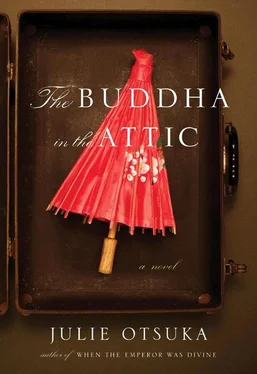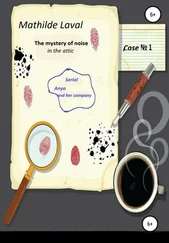THEY LEARNED which mothers would let them come over (Mrs. Henke, Mrs. Woodruff, Mrs. Alfred Chandler III) and which would not (all the other mothers). They learned which barbers would cut their hair (the Negro barbers) and which barbers to avoid (the grumpy barbers on the south side of Grove). They learned that there were certain things that would never be theirs: higher noses, fairer complexions, longer legs that might be noticed from afar. Every morning I do my stretching exercises but it doesn’t seem to help . They learned when they could go swimming at the YMCA— Colored days are on Mondays —and when they could go to the picture show at the Pantages Theater downtown (never). They learned that they should always call the restaurant first. Do you serve Japanese? They learned not to go out alone during the daytime and what to do if they found themselves cornered in an alley after dark. Just tell them you know judo . And if that didn’t work, they learned to fight back with their fists. They respect you when you’re strong . They learned to find protectors. They learned to hide their anger. No, of course. I don’t mind. That’s fine. Go ahead . They learned never to show their fear. They learned that some people are born luckier than others and that things in this world do not always go as you plan.
STILL, they dreamed. One swore she would one day marry a preacher so she wouldn’t have to pick berries on Sundays. One wanted to save up enough money to buy his own farm. One wanted to become a tomato grower like his father. One wanted to become anything but. One wanted to plant a vineyard. One wanted to start his own label. I’d call it Fukuda Orchards . One could not wait until the day she got off the ranch. One wanted to go to college even though no one she knew had ever left the town. I know it’s crazy, but … One loved living out in the country and never wanted to leave. It’s better here. Nobody knows who we are . One wanted something more but could not say exactly what it was. This just isn’t enough . One wanted a Swing King drum set with hi-hat cymbals. One wanted a spotted pony. One wanted his own paper route. One wanted her own room, with a lock on the door. Anyone who came in would have to knock first . One wanted to become an artist and live in a garret in Paris. One wanted to go to refrigeration school. You can do it through the mail . One wanted to build bridges. One wanted to play the piano. One wanted to operate his own fruit stand alongside the highway instead of working for somebody else. One wanted to learn shorthand at the Merritt Secretarial Academy and get an inside job in an office. Then I’d have it made . One wanted to become the next Great Togo on the professional wrestling circuit. One wanted to become a state senator. One wanted to cut hair and open her own salon. One had polio and just wanted to breathe without her iron lung. One wanted to become a master seamstress. One wanted to become a teacher. One wanted to become a doctor. One wanted to become his sister. One wanted to become a gangster. One wanted to become a star. And even though we saw the darkness coming we said nothing and let them dream on.
The rumors began to reach us on the second day of the war.
THERE WAS TALK of a list. Some people being taken away in the middle of the night. A banker who went to work and never came home. A barber who disappeared during his lunch break. A few fishermen who had gone missing. Here and there, a boardinghouse, raided. A business, seized. A newspaper shut down. But this was all happening somewhere else. In distant valleys and faraway towns. In the big city, where all the women wore high heels and lipstick and danced until late in the night. “Nothing to do with us,” we said. We were simple women who lived quietly and kept to ourselves. Our own husbands would be safe.
FOR SEVERAL DAYS we stayed inside with our shades drawn and listened to the news of the war on the radio. We removed our names from our mailboxes. We brought in our shoes from the front porch. We did not send our children to school. At night we bolted our doors and spoke among ourselves in whispers. We closed our windows tight. Our husbands drank more than usual and stumbled early into bed. Our dogs fell asleep at our feet. No men came to our doors.
CAUTIOUSLY, we began to emerge from our homes. It was December and our older daughters had already left to work as maids in distant towns and the days were quiet and still. The darkness fell early. We rose every morning before dawn in the countryside and went out into the vineyards and pruned back the grapevines. We pulled up carrots from the cold, damp earth. We cut celery. We bunched broccoli. We dug deep furrows into the soil to catch the rain when it fell. Hawks drifted down through the rows of trees in the almond orchards and at dusk we could hear the coyotes calling out to one another in the hills. In J-town we gathered every evening in each other’s kitchens and exchanged the latest news. Perhaps there had been a raid in the next county over. A town surrounded after dark. A dozen houses searched. Telephone wires had been cut. Desks overturned. Documents confiscated. A few more men crossed off the list. “Grab your toothbrush,” they were told, and that was it, they were never heard from again.
SOME SAID that the men had been put on trains and sent far away, over the mountains, to the coldest part of the country. Some said they were enemy collaborators and would be deported within days. Some said they had been shot. Many of us dismissed the rumors as rumors but found ourselves spreading them—wildly, recklessly, and seemingly against our own will—nonetheless. Others of us refused to speak of the missing men by day but at night they came to us in our dreams. A few of us dreamed we were the missing men ourselves. One of us—Chizuko, who ran the kitchen at the Kearney Ranch and always liked to be prepared—packed a small suitcase for her husband and left it beside their front door. Inside was a toothbrush, a shaving kit, a bar of soap, a bar of chocolate— his favorite —and a clean change of clothes. These were the things she knew he would need to bring with him if his name came up next on the list. Always, though, there was the vague but nagging fear that she had left something out, some small but crucial item that, on some unknown date in some unknown court in the future, would serve as incontestable proof of her husband’s innocence. Only what, she asked herself, could that small item be? A Bible? A pair of reading glasses? A different kind of soap? Something more fragrant, perhaps? Something more manly? I hear they arrested a Shinto priest in the valley for owning a toy bamboo flute .
WHAT DID WE KNOW, exactly, about the list? The list had been drawn up hastily, on the morning of the attack. The list had been drawn up more than one year ago. The list had been in existence for almost ten years. The list was divided into three categories: “known dangerous” (Category A), “potentially dangerous” (Category B), and “pro-Axis inclinations” (Category C). It was nearly impossible to get your name on the list. It was extremely easy to get your name on the list. Only people who belonged to our race were on the list. There were Germans and Italians on the list, but their names appeared toward the bottom. The list was written in indelible red ink. The list was typewritten on index cards. The list did not exist. The list existed, but only in the mind of the director of military intelligence, who was known for his perfect recall. The list was a figment of our imaginations. The list contained over five hundred names. The list contained over five thousand names. The list was endless. Every time an arrest was made another name was crossed off the list. Every time a name was crossed off the list a new name was added to it. New names were added to the list daily. Weekly. Hourly.
Читать дальше












